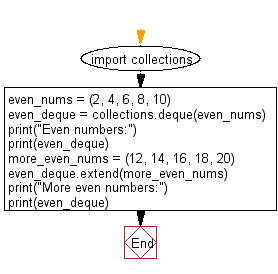Python Exercise: Add more number of elements to a deque object from an iterable object
Python Collections: Exercise-9 with Solution
Write a Python program to add more number of elements to a deque object from an iterable object.
Sample Solution:
Python Code:
import collections
even_nums = (2, 4, 6, 8, 10)
even_deque = collections.deque(even_nums)
print("Even numbers:")
print(even_deque)
more_even_nums = (12, 14, 16, 18, 20)
even_deque.extend(more_even_nums)
print("More even numbers:")
print(even_deque)
Sample Output:
Even numbers: deque([2, 4, 6, 8, 10]) More even numbers: deque([2, 4, 6, 8, 10, 12, 14, 16, 18, 20])
Flowchart:
Visualize Python code execution:
The following tool visualize what the computer is doing step-by-step as it executes the said program:
Python Code Editor:
Have another way to solve this solution? Contribute your code (and comments) through Disqus.
Previous: Write a Python program to create a deque from an existing iterable object.
Next: Write a Python program to remove all the elements of a given deque object.
What is the difficulty level of this exercise?
Test your Python skills with w3resource's quiz
Python: Tips of the Day
Takes any number of iterable objects or objects with a length property and returns the longest one. If multiple objects have the same length, the first one will be returned
Example:
def tips_longest(*args):
return max(args, key=len)
print(tips_longest('this', 'is', 'a', 'Python', 'Tutorial'))
print(tips_longest([1, 2, 3], [1, 2, 3, 4, 5], [1, 2]))
print(tips_longest([1, 2, 3], 'python'))
Output:
Tutorial [1, 2, 3, 4, 5] python
- New Content published on w3resource:
- Scala Programming Exercises, Practice, Solution
- Python Itertools exercises
- Python Numpy exercises
- Python GeoPy Package exercises
- Python Pandas exercises
- Python nltk exercises
- Python BeautifulSoup exercises
- Form Template
- Composer - PHP Package Manager
- PHPUnit - PHP Testing
- Laravel - PHP Framework
- Angular - JavaScript Framework
- React - JavaScript Library
- Vue - JavaScript Framework
- Jest - JavaScript Testing Framework

